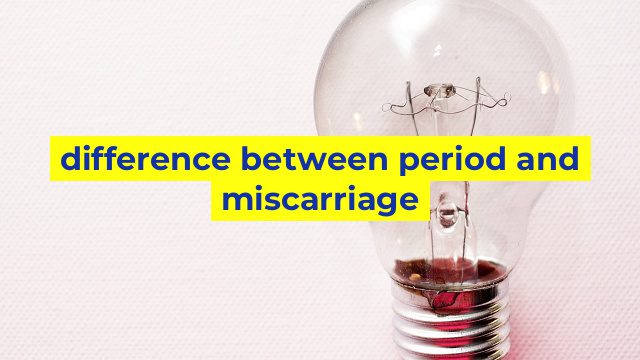The Difference Between Period and Miscarriage
Introduction
It is not uncommon for women to experience vaginal bleeding similar to their period during pregnancy. This naturally raises concerns about a possible miscarriage, especially if the bleeding is heavy and accompanied by cramping. However, it is important to understand that there are significant differences between period and miscarriage.
Period
A menstrual period is a natural part of a woman’s reproductive cycle that occurs approximately once a month. It involves the shedding of the endometrial lining of the uterus, in preparation for a possible pregnancy. The bleeding usually lasts between 3 to 7 days, and the amount and consistency of the blood may vary throughout the cycle. Along with the bleeding, many women also experience symptoms like cramps, bloating, headaches, and mood changes.
Miscarriage
Miscarriage refers to the spontaneous loss of a pregnancy before the 20th week. It is a devastating experience for many women and their partners, as it may involve severe emotional and physical pain. Miscarriages can occur due to various reasons, such as chromosomal abnormalities, hormonal imbalances, infections, and structural issues in the uterus. Some of the common signs and symptoms of a miscarriage include vaginal bleeding, cramping, abdominal pain, back pain, and the passing of tissue or clots.
The Difference
The main difference between period and miscarriage is that a period is a normal process of the reproductive system, while miscarriage is a complication that may result in the loss of a pregnancy. While both involve vaginal bleeding, the amount and type of bleeding in a miscarriage are typically different than that of a period. Miscarriage bleeding may be heavier, darker, and may occur for a longer duration than a typical menstrual period. Additionally, miscarriage bleeding may be accompanied by the passage of tissue or clots, which is not the case with periods.
Conclusion
In sum, while vaginal bleeding may cause concern for women during pregnancy, it is essential to understand the difference between period and miscarriage. However, if the bleeding is heavy, sudden, and accompanied by severe pain or fever, it is imperative to seek medical attention. Early detection and treatment can help prevent potential complications and ensure a healthy pregnancy.
Table difference between period and miscarriage
| Period | Miscarriage |
|---|---|
| Regular and cyclical bleeding that occurs in women of reproductive age | Spontaneous loss of a pregnancy before the 20th week of gestation |
| Usually lasts for 3-7 days | Can occur anytime during the first 20 weeks of pregnancy |
| Amount of blood loss is generally less than a miscarriage | May involve heavy bleeding and passing of clots or tissue |
| Not usually associated with severe pain or cramping | May involve severe abdominal pain or cramping |
| Does not pose a risk to future pregnancies | May increase the risk of future miscarriages or pregnancy complications |
